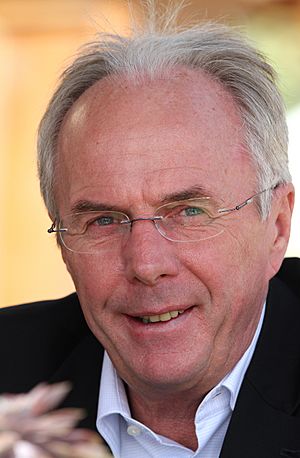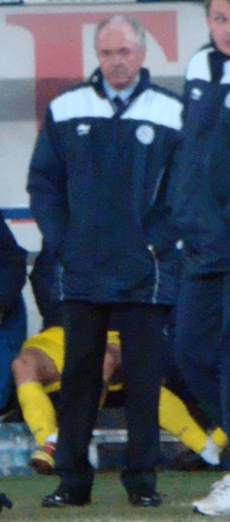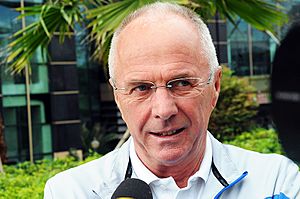Sven-Göran Eriksson facts for kids

Eriksson in 2012
|
|||
| Personal information | |||
|---|---|---|---|
| Full name | Sven-Göran Eriksson | ||
| Date of birth | 5 February 1948 | ||
| Place of birth | Sunne, Sweden | ||
| Date of death | 26 August 2024 (aged 76) | ||
| Place of death | Sunne, Sweden | ||
| Height | 1.78 m (5 ft 10 in) | ||
| Position(s) | Right-back | ||
| Senior career* | |||
| Years | Team | Apps | (Gls) |
| 1964–1971 | Torsby | 109 | (23) |
| 1971–1972 | Sifhälla | 22 | (1) |
| 1972–1973 | Karlskoga | 19 | (4) |
| Total | 150 | (28) | |
| Managerial career | |||
| 1977–1978 | Degerfors | ||
| 1979–1982 | IFK Göteborg | ||
| 1982–1984 | Benfica | ||
| 1984–1987 | Roma | ||
| 1987–1989 | Fiorentina | ||
| 1989–1992 | Benfica | ||
| 1992–1997 | Sampdoria | ||
| 1997–2001 | Lazio | ||
| 2001–2006 | England | ||
| 2007–2008 | Manchester City | ||
| 2008–2009 | Mexico | ||
| 2009-2010 | Notts County | ||
| 2010 | Ivory Coast | ||
| 2010–2011 | Leicester City | ||
| 2013–2014 | Guangzhou R&F | ||
| 2016–2017 | Shenzhen | ||
| 2018–2019 | Philippines | ||
| *Club domestic league appearances and goals | |||
Sven-Göran Eriksson (born 5 February 1948 – died 26 August 2024) was a famous Swedish football player and manager. He was known for his successful career, winning many trophies with different clubs.
After playing as a right-back, Eriksson became a football manager. From 1977 to 2001, he won 18 trophies with clubs in Sweden, Portugal, and Italy. He also won the UEFA Cup and the European Cup Winners' Cup. He even reached the final of the European Cup.
Later, Eriksson managed national teams like England, Mexico, Philippines, and the Ivory Coast. He also managed English clubs Manchester City and Leicester City. Eriksson coached in ten different countries during his career.
Contents
Early Life and Football Start
Sven-Göran Eriksson was born on 5 February 1948 in Sunne, Sweden. He grew up in Torsby. His father was a bus conductor, and his mother worked in a shop. People often called him "Svennis," a nickname that stuck with him.
Playing Days
Eriksson started playing football for Torsby at age 16. He later played for Sifhälla and Karlskoga. He also worked as a physical education teacher.
He stopped playing football in 1975 when he was 27. He said he was an "average defender" but rarely made mistakes.
Becoming a Manager
First Steps at Degerfors
After stopping his playing career, Eriksson became an assistant coach at Degerfors. A year later, he became the main manager. He led the team to promotion in 1978.
Big Success with IFK Göteborg
Eriksson's success caught the eye of bigger clubs. He became the manager of IFK Göteborg in 1979. Many players had never heard of him before.
His team finished second in the league and won the Svenska Cupen (Swedish Cup). He focused on tactics and hard work, which helped the team win. In 1982, Göteborg won the treble: the league, the Swedish Cup, and the UEFA Cup. This was a huge achievement for a Swedish club. They beat strong teams like Valencia and Hamburger SV to win the UEFA Cup.
Moving to Portugal: Benfica
Eriksson's European success led him to Benfica in Portugal in 1982. He quickly made an impact, winning the Portuguese league and cup in his first season. He won another league title in his second year.
Time in Italy: Roma and Fiorentina
In 1984, Eriksson moved to Italy to manage Roma. He won the Coppa Italia (Italian Cup) with them in 1986. He left Roma in 1987.
He then managed Fiorentina for two years, but didn't win any trophies there.
Back to Benfica
Eriksson returned to Benfica in 1989. He led them to the final of the 1989–90 European Cup (now the Champions League), but they lost. He won another Portuguese league title in 1991.
Sampdoria and Lazio Triumphs
In 1992, Eriksson went back to Italy to manage Sampdoria. He won another Coppa Italia in 1994. He focused on a strong defensive system.
In 1997, he became the manager of Lazio. He brought his assistant, Tord Grip, with him. At Lazio, Eriksson won many trophies. He won the Coppa Italia and Supercoppa Italiana twice each. He also won the European Cup Winners' Cup in 1999. His biggest success was winning the Serie A title (the Scudetto) in 2000. This was only the second time Lazio had won the Italian championship.
Managing England
In 2001, Sven-Göran Eriksson became the manager of the England national football team. He was the first foreign manager for England. His first game was a 3–0 win against Spain.
World Cup 2002
A big moment came on 1 September 2001, when England won 5–1 away against Germany in a World Cup qualifier. This helped England qualify directly for the 2002 FIFA World Cup. At the World Cup, England reached the quarter-finals. They lost 2–1 to Brazil, who went on to win the tournament.
Euro 2004
England qualified for UEFA Euro 2004. In their first match, they lost to France in injury time. However, wins against Switzerland and Croatia meant they reached the quarter-finals. They lost to hosts Portugal on penalties.
World Cup 2006
Eriksson's contract was extended to cover UEFA Euro 2008. In 2006, he was tricked by a reporter pretending to be a wealthy Arab. This led to the FA announcing that Eriksson would leave his job after the 2006 FIFA World Cup.
At the 2006 World Cup, England topped their group. They beat Ecuador in the Round of 16. But again, they were knocked out by Portugal on penalties in the quarter-finals.
Despite the criticism, Eriksson improved England's FIFA World Rankings from 17th to 5th. He lost only three competitive games (excluding extra time) and helped England qualify for all three major tournaments he managed.
Later Coaching Roles
Manchester City
In July 2007, Eriksson became the new manager of Manchester City. He was their first manager from outside the UK. He signed several new players. Manchester City started the season very well, even beating Manchester United. Eriksson won the Manager of the Month award for August.
However, results later became poor. The club's owner decided to replace him. Manchester City finished ninth in the league. Eriksson left the club in June 2008.
Mexico National Team
In June 2008, Eriksson became the manager of the Mexico national team. His first game was a 2–1 win against Honduras. However, Mexico had some poor results, and Eriksson was under pressure. He was removed as coach in April 2009.
Notts County
In July 2009, Eriksson became the director of football at Notts County, a team in England's fourth division. He was excited by plans to take the club to the top of the Premier League. However, the club faced financial problems. Eriksson resigned in February 2010 to help the club's new takeover.
Ivory Coast National Team
In March 2010, Eriksson became the manager of the Ivory Coast national team. He led them at the 2010 FIFA World Cup. They drew with Portugal and lost to Brazil. Despite beating North Korea, Ivory Coast did not make it past the group stage. His contract ended in June 2010.

Leicester City
Eriksson was appointed manager of Leicester City in October 2010. The team was struggling in the Championship league. Under Eriksson, Leicester's results improved, and they climbed the table. They even took Premier League champions Manchester City to a replay in the FA Cup.
However, their form later dropped. Eriksson left the club in October 2011. Some players he signed, like Kasper Schmeichel, David Nugent, and Paul Konchesky, later helped Leicester win the Championship and even the Premier League.
Coaching in China and the Philippines
In 2013, Eriksson moved to China to manage Guangzhou R&F. He led them to third place in the league, helping them qualify for the AFC Champions League for the first time. He later managed Shanghai SIPG and Shenzhen in China.
In October 2018, Eriksson returned to international football as head coach of the Philippines national team. He led them in the 2018 AFF Championship, where they reached the semi-finals. He also coached them in their first-ever 2019 AFC Asian Cup appearance. After the Asian Cup, Eriksson ended his time as head coach but continued as a consultant.
Managerial Style
Eriksson was known for his smart tactical approach. He was influenced by English managers who used a 4–4–2 formation with zonal marking and pressing. He focused on getting results and making sure his teams worked hard and understood their roles.
At Lazio, he used flexible formations and focused on quick attacks. He also valued his players' physical and mental strength. He was good at rotating players and changing their positions to help the team. For example, he turned Siniša Mihajlović into a great central defender.
Eriksson was also known for his positive leadership. Many of his former players, like Simone Inzaghi and Roberto Mancini, became successful coaches themselves.
Personal Life
Eriksson was married to Ann-Christine Pettersson from 1977 to 1994, and they had two children. He later had a relationship with Nancy Dell'Olio. His autobiography, My Story, was published in 2013.
Illness and Passing
In January 2024, Eriksson shared that he had been diagnosed with pancreatic cancer. He said he had about a year to live. In March 2024, he managed the Liverpool Legends in a charity match. His former clubs honored him at their stadiums. Sven-Göran Eriksson passed away on 26 August 2024, at the age of 76.
Managerial Statistics
| Nation | Team | From | To | Record | ||||
|---|---|---|---|---|---|---|---|---|
| Pld | W | D | L | Win% | ||||
| Degerfors | January 1977 | December 1978 | — | |||||
| IFK Göteborg | January 1979 | June 1982 | 134 | 76 | 34 | 24 | 56.72 | |
| Benfica | July 1982 | June 1984 | 78 | 57 | 14 | 7 | 73.08 | |
| Roma | July 1984 | May 1987 | 125 | 58 | 36 | 31 | 46.40 | |
| Fiorentina | July 1987 | June 1989 | 64 | 21 | 20 | 23 | 32.81 | |
| Benfica | July 1989 | June 1992 | 144 | 94 | 32 | 18 | 65.28 | |
| Sampdoria | July 1992 | June 1997 | 198 | 83 | 58 | 57 | 41.92 | |
| Lazio | July 1997 | January 2001 | 136 | 78 | 32 | 26 | 57.35 | |
| England | 12 January 2001 | 1 July 2006 | 67 | 40 | 17 | 10 | 59.70 | |
| Manchester City | 6 July 2007 | 2 June 2008 | 45 | 19 | 11 | 15 | 42.22 | |
| Mexico | June 2008 | April 2009 | 13 | 6 | 1 | 6 | 46.15 | |
| Ivory Coast | March 2010 | June 2010 | 5 | 2 | 2 | 1 | 40.00 | |
| Leicester City | October 2010 | October 2011 | 49 | 22 | 12 | 15 | 44.90 | |
| Guangzhou R&F | June 2013 | November 2014 | 48 | 25 | 10 | 13 | 52.08 | |
| Shanghai SIPG | November 2014 | November 2016 | 76 | 42 | 20 | 14 | 55.26 | |
| Shenzhen | December 2016 | June 2017 | 15 | 6 | 5 | 4 | 40.00 | |
| Philippines | October 2018 | January 2019 | 10 | 2 | 3 | 5 | 20.00 | |
| Total | 1,207 | 629 | 308 | 270 | 52.11 | |||
Honours and Achievements
Sven-Göran Eriksson won many trophies as a manager:
Degerfors
- Swedish Football Division 3: 1978
IFK Göteborg
- Swedish Cup: 1978–79, 1981–82
- Allsvenskan (Swedish League): 1982
- UEFA Cup: 1981–82
Benfica
- Primeira Divisão (Portuguese League): 1982–83, 1983–84, 1990–91
- Taça de Portugal (Portuguese Cup): 1982–83
- Supertaça Cândido de Oliveira (Portuguese Super Cup): 1989
- European Cup runner-up: 1989–90
- UEFA Cup runner-up: 1982–83
Roma
- Coppa Italia (Italian Cup): 1985–86
Sampdoria
- Coppa Italia: 1993–94
Lazio
- Serie A (Italian League): 1999–2000
- Coppa Italia: 1997–98, 1999–2000
- Supercoppa Italiana (Italian Super Cup): 1998, 2000
- UEFA Cup Winners' Cup: 1998–99
- UEFA Super Cup: 1999
- UEFA Cup runner-up: 1997–98
Individual Awards
- Serie A Coach of the Year: 1999–2000
- BBC Sports Personality of the Year Coach Award: 2001
- Premier League Manager of the Month: August 2007
Images for kids
See also
 In Spanish: Sven-Göran Eriksson para niños
In Spanish: Sven-Göran Eriksson para niños
 | Emma Amos |
 | Edward Mitchell Bannister |
 | Larry D. Alexander |
 | Ernie Barnes |



